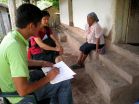Local media helps communities to cope after traumatic events
Local media's sensitive approach to communities trying to cope in the face of trauma helps local people adapt to the stressful events by strengthening community bonds
2015-05-06
(Press-News.org) Local media's sensitive approach to communities trying to cope in the face of trauma helps local people adapt to the stressful events by strengthening community bonds.
This is one of the findings of a study by MSc student Suzanne Day from Lancaster University being presented today, Wednesday 6 May 2015, at the British Psychological Society Annual Conference in Liverpool.
The study examined how West Cumbrian communities coped with two local traumatic events in a short space of time (the November 2009 floods and June 2010 Cumbria shootings). A total of 77 adults who were living and still live in the area at the time of the events completed a questionnaire about how much they had been affected. Ten also took part in interviews.
Analysis found that that communities coped by sticking together and sharing experiences. The role of the media impacted on how the community responded, with local media reportedly being sensitive and helping to facilitate community resilience and the national media largely being invasive.
However, there were significant differences in how they reacted to the different tragedies.
Suzanne Day said: "The results for the two events were very different with the floods (a natural event) providing evidence of communities pulling together in some cases and being pulled apart in others. This was mainly a result of relative deprivation with communities who perceived they received little support feeling alienated from the rest of the area. The communities that did receive external support banded together with a shared sense of collective identity.
"During the shootings the community battened down the hatches not wanting support from any external agencies. Their strong sense of community was reinforced with the presence of national media, which at times they found intrusive. This was in contrast to the sensitive presence of local media which helped bond and strengthen the community."
INFORMATION:
PR15.042
Date: 5 May 2015
DURING THE CONFERENCE (5 - 7 May) contact the conference press office on 0151 707 4642 / 079524 84140 and presscentre@bps.org.uk
Editor's notes
The research was undertaken by Suzanne during her MSc in Psychological Research Methods at Lancaster University. Suzanne is currently working for UCLan as a Research Officer full time and doing a PhD part time.
The British Psychological Society annual conference takes place from 5 - 7 May 2015 at the Arena and Convention Centre, Liverpool. For details of the programme visit: http://www.bps.org.uk/ac2015
Follow the conference #bpsconf
Follow the BPSOfficial on Twitter and Facebook.
The BPS is the representative body for psychology and psychologists in the UK. We are responsible for the development, promotion and application of psychology for the public good. For more information visit http://www.bps.org.uk.
ELSE PRESS RELEASES FROM THIS DATE:
2015-05-06
A fecal microbiota transplant (FMT) not only cured a case of Clostridium difficile (C. diff) infection in a 66 year old man; it eliminated populations of multi-drug resistant organisms both in the patient's gastrointestinal tract, and several other body sites. This case report is published ahead of print April 15 in the Journal of Clinical Microbiology, a publication of the American Society for Microbiology.
The patient suffered from quadriplegia and multiple other conditions, requiring a ventilator, a feeding tube, and chronic foley catheterization. As a result of his ...
2015-05-06
Imagine taking strands of DNA - the material in our cells that determines how we look and function - and using it to build tiny structures that can deliver drugs to targets within the body or take electronic miniaturization to a whole new level.
While it may still sound like science fiction to most of us, researchers have been piecing together and experimenting with DNA structures for decades. And, in recent years, work by scientists such as McGill University chemistry professor Hanadi Sleiman has moved the use of man-made DNA structures closer to a variety of real-world ...
2015-05-06
A study of survival rates in trauma patients following health insurance reform in Massachusetts found a passing increase in adjusted mortality rates, an unexpected finding suggesting that simply providing insurance incentives and subsidies may not improve survival for trauma patients, according to a report published online by JAMA Surgery.
Massachusetts introduced health care reform in 2006 to expand health insurance coverage and improve outcomes. Some previous research has suggested improved survival rates following injury in patients with insurance. But the relationship ...
2015-05-06
This news release is available in French. Montreal, May 6, 2015 -- Plans for summer holidays are already taking shape. But before jetting off for some fun in the sun, many travellers will have to cope with long delays on the airport runway.
Thanks to new research from Concordia University, however, that time spent twiddling your thumbs on the tarmac could be significantly reduced.
In a new study, forthcoming in the American Institute of Aeronautics and Astronautics' Journal of Aircraft, Concordia mechanical engineering professor Georgios Vatistas describes a new ...
2015-05-06
A Stirling scientist who discovered a new Scottish flower has made an unexpected second finding which provides unique insight into our understanding of evolution.
Dr Mario Vallejo-Marin, a Plant Evolutionary Biologist at the University of Stirling, first unearthed a new species of monkeyflower on the bank of a stream in South Lanarkshire, Southern Scotland in 2012.
A subsequent expedition two years later led Dr Vallejo-Marin to locate the impressive yellow flower some 350 miles north, near Stromness on the Orkney Islands off the north coast of Scotland.
"Orkney was ...
2015-05-06
There are now over 80,000 apps marketed as "educational" in the Apple app store, the majority of which are targeted towards children and even babies. Parents are led to believe that these apps provide real learning opportunities for their children, but scientific research suggests that many of the apps are nothing more than digital candy.
"Many apps marketed as 'educational' are basically the equivalent of sugary foods," says Kathy Hirsh-Pasek of Temple University, co-author on a new report investigating educational apps. "At best, most of these apps will do no harm; ...
2015-05-06
NEW YORK (May 6, 2015) -- To fence or not to fence? That is the question facing conservationists concerned with barriers that keep wildlife in and people out.
According to a new study by the Zoological Society of London (ZSL), Wildlife Conservation Society (WCS) and other groups, appearing in April 20 edition of the Journal of Applied Ecology, new policies must be developed before fences are erected - particularly in dryland ecosystems where mobility is essential for both humans and wildlife.
Some nations are considering fences as a means to protect remnant wildlife ...
2015-05-06
This news release is available in German.
An X-ray study carried out at DESY allows to improve the quality of chocolate. The study offers new insights into the formation of fat bloom, an unwelcome white layer that occasionally forms on chocolate. "Although fat blooming is perfectly harmless, it causes millions in damage to the food industry as a result of rejects and customer complaints," explains the main author of the study, Svenja Reinke, from the Hamburg University of Technology (TUHH). "Despite this well known quality issue, comparatively little has been known ...
2015-05-06
(BOSTON) - Increasingly, scientists across the world and in the Unites States are reporting new and groundbreaking innovations in biotechnology with transformative implications in human health and environmental sustainability. Examples range from synthetically created, metabolically-engineered bacteria for the sustainable production of fuel to gene editing therapies that could one day help in the prevention and treatment of a large number of human diseases.
While these technologies are developed in laboratories, researchers are not only giving utmost consideration to ...
2015-05-06
New Haven, Conn. - Convincing a large group of people to change its behavior is no popularity contest, a new study shows.
In a novel experiment, researchers found that certain public health interventions work best when key "influencers" in a face-to-face social network are exposed to the program. What's surprising, they say, is that those key influencers are not the most socially connected people in the network.
Furthermore, those individuals can be identified through a survey method informed by network structure rather than costly and time-consuming social network mapping. ...
LAST 30 PRESS RELEASES:
[Press-News.org] Local media helps communities to cope after traumatic events
Local media's sensitive approach to communities trying to cope in the face of trauma helps local people adapt to the stressful events by strengthening community bonds



